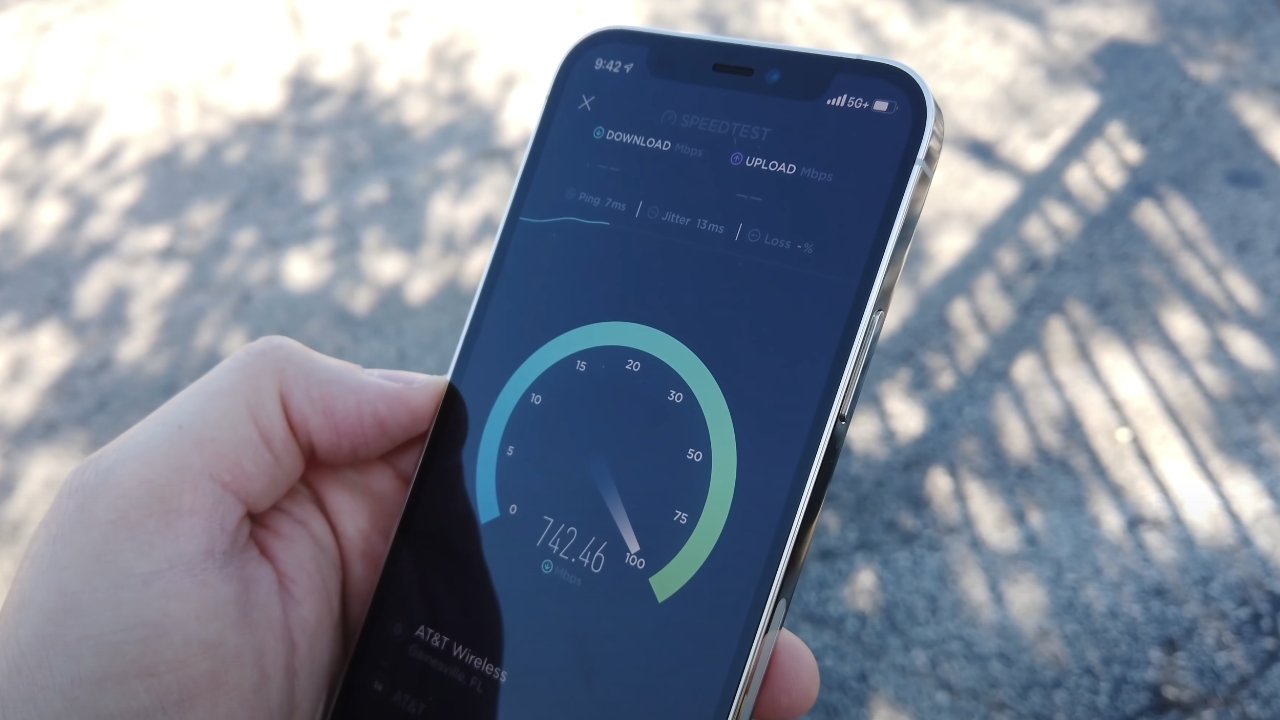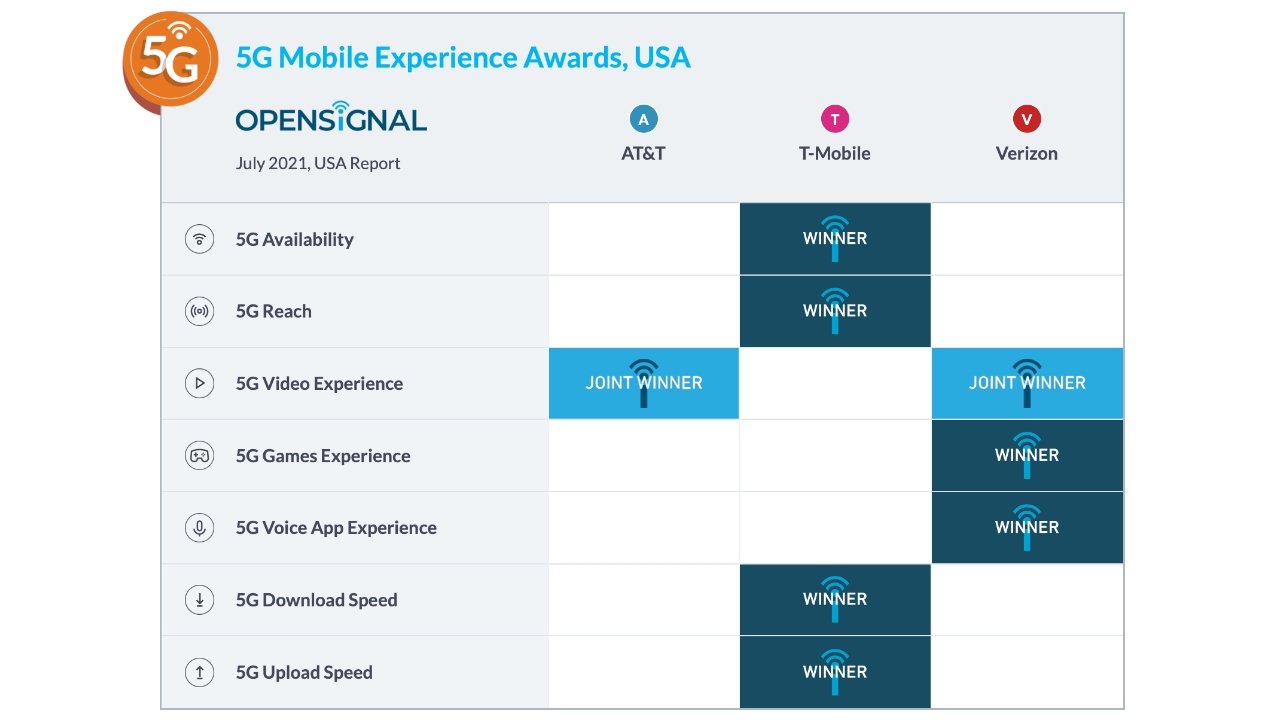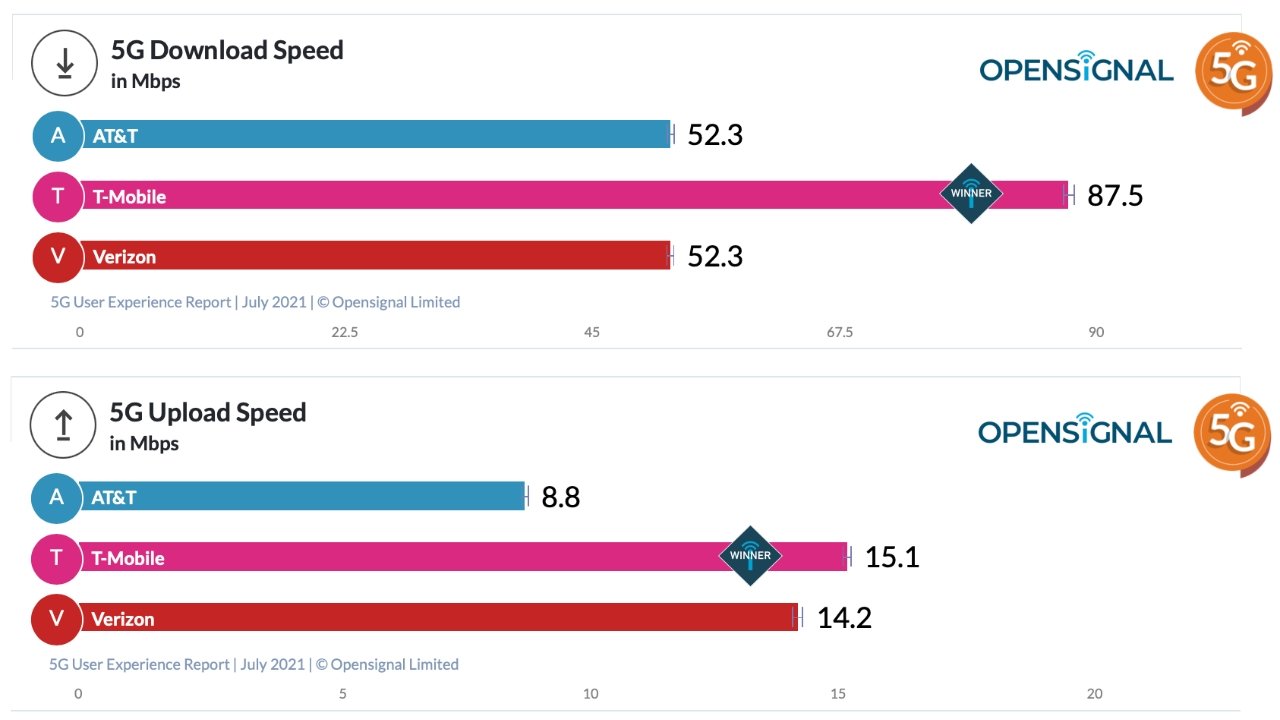T-Mobile has fastest 5G speeds with widest availability in the US
An industry report shows T-Mobile is the top mobile carrier in 5G download speed and widespread availability across the US.

mmWave 5G provides high speeds, but isn't widely available
Apple's iPhone 12 lineup is capable of 5G speeds, which has been a big selling point for the devices. The high-bandwidth wireless technology allows for near gigabit internet speeds when ideal conditions are met.
According to an Opensignal study, shared by 9to5Mac, T-Mobile has been leading other carriers in terms of download speed and availability across the US. However, the superior mmWave 5G technology is rarely used by T-Mobile customers.

T-Mobile wins out in categories that affect more average users. Image source: Opensignal
The study revealed that while T-Mobile had a higher percentage of customers connected to 5G with faster speeds when connected, other services may provide superior experiences. The voice, video, and gaming experiences were deemed better on Verizon and AT&T than T-Mobile, despite the bandwidth and availability of T-Mobile 5G.

Download and upload speed results provided by Opensignal
The download speed of T-Mobile reached 87.5 Mbps, up from 71.3 Mbps in the April report. These speeds are expected when using the more-widely-spread sub-6GHz 5G service, while mmWave 5G will enable connections closer to gigabit speeds in ideal situations.
The mmWave 5G speed test showed T-Mobile averaged 312 Mbps while Verizon nearly doubled this at 618.4 Mbps. Availability of mmWave 5G is highly dependent on event locations like sports stadiums or convention centers.
Due to this availability limitation, only about 0.2% of T-Mobile users connected to mmWave 5G during the quarter. Therefore, the sub-6GHz 5G availability and speed will be more impactful to the average user -- which are T-Mobile's strengths.
T-Mobile merged with Sprint in an attempt to compete with Verizon and AT&T. So far, the effort seems to be working as it continues to expand availability and download speed at a faster rate than its rivals.
Keep up with everything Apple in the weekly AppleInsider Podcast -- and get a fast news update from AppleInsider Daily. Just say, "Hey, Siri," to your HomePod mini and ask for these podcasts, and our latest HomeKit Insider episode too.If you want an ad-free main AppleInsider Podcast experience, you can support the AppleInsider podcast by subscribing for $5 per month through Apple's Podcasts app, or via Patreon if you prefer any other podcast player.

mmWave 5G provides high speeds, but isn't widely available
Apple's iPhone 12 lineup is capable of 5G speeds, which has been a big selling point for the devices. The high-bandwidth wireless technology allows for near gigabit internet speeds when ideal conditions are met.
According to an Opensignal study, shared by 9to5Mac, T-Mobile has been leading other carriers in terms of download speed and availability across the US. However, the superior mmWave 5G technology is rarely used by T-Mobile customers.

T-Mobile wins out in categories that affect more average users. Image source: Opensignal
The study revealed that while T-Mobile had a higher percentage of customers connected to 5G with faster speeds when connected, other services may provide superior experiences. The voice, video, and gaming experiences were deemed better on Verizon and AT&T than T-Mobile, despite the bandwidth and availability of T-Mobile 5G.

Download and upload speed results provided by Opensignal
The download speed of T-Mobile reached 87.5 Mbps, up from 71.3 Mbps in the April report. These speeds are expected when using the more-widely-spread sub-6GHz 5G service, while mmWave 5G will enable connections closer to gigabit speeds in ideal situations.
The mmWave 5G speed test showed T-Mobile averaged 312 Mbps while Verizon nearly doubled this at 618.4 Mbps. Availability of mmWave 5G is highly dependent on event locations like sports stadiums or convention centers.
Due to this availability limitation, only about 0.2% of T-Mobile users connected to mmWave 5G during the quarter. Therefore, the sub-6GHz 5G availability and speed will be more impactful to the average user -- which are T-Mobile's strengths.
T-Mobile merged with Sprint in an attempt to compete with Verizon and AT&T. So far, the effort seems to be working as it continues to expand availability and download speed at a faster rate than its rivals.
Keep up with everything Apple in the weekly AppleInsider Podcast -- and get a fast news update from AppleInsider Daily. Just say, "Hey, Siri," to your HomePod mini and ask for these podcasts, and our latest HomeKit Insider episode too.If you want an ad-free main AppleInsider Podcast experience, you can support the AppleInsider podcast by subscribing for $5 per month through Apple's Podcasts app, or via Patreon if you prefer any other podcast player.

Comments
Crap coverage? No problem, but if you do manage to get some 5G, how's the "experience"?
BTW, T-Mobile got a whole bunch of spectrum from their merger with Sprint. This much improved their previously lackluster coverage (not just 5G). Now Vz and AT&T will have to pony up at the next spectrum auction.
Nokia 5G-24W-A modem on high window sill, 1.3 kms line-of-site to tower.
Yeah, I tried asking that question in a 5G thread last year. The answers I got consisted of "because it's the future!" "low latency lets you do remote surgery" "increase connections allow for autonomous cars" and other irrelevant uses.
Essentially, fast download speeds are nice, but *good* LTE speed can stream a HD movie, so it's more than adequate for what 99% of people need. The industry has pushed 5G as 'the next big thing' to convince everyone to buy new equipment but until there are actual uses for smart phones that require the added capabilities it's mainly bragging rights. There are also benefits to the industry, but we don't see those directly.
There have been many times in the past year when lower latencies would have been nice for my kids' music lessons over zoom, but that was on home wifi, going back to my point about latency being dependent on infrastructure.
One possible benefit of 5G is better coverage and more efficient use of spectrum. This is more difficult to quantify, though and I haven't seen anything definite about it.
Rather than switch back, I have added a built in AT&T hotspot to my car with unlimited LTE data that can patch the holes in the T-Mobile network with Wi-Fi calling. I frequently drive in areas well away from the cities and Interstate corridors where T-Mobile has long been good and saw it to be full of holes. Since I work in the medical field and pull call, I have to drive in bad weather and having a highly reliable cell signal is necessary.
T-Mobile says they are hard at work flipping Sprint towers to T-Mobile and upgrading and rationalizing its network, but I assure you that the coverage maps they offer for both 4G LTE and 5G are wishful thinking. I am going to give them a chance to improve and if they do not, I will be going back to AT&T. I got a heavily discounted year on the AT&T mobile hotspot in my car and I hopefully will not need it by the time the year I prepaid for expires.
I'm guessing you are old and you don't stream live video from your smartphone. A lot of kids do. There's also stuff like uploading 4K video. iPhones -- like many other smartphone brands -- has offered 4K video recording for years. Note that a lot of YouTubers have been shooting, editing and uploading 4K video from their smartphones FOR YEARS. Last year Apple started offering Dolby Vision on the iPhone 12 Pro models.
The old paradigm of taking your phone home, plugging into your computer to transfer video and firing up a desktop video editing application before finally using your terrestrial broadband Internet connection is obsolete.
Perhaps more important the mobile operators want more of their users to switch to 5G networks which handle more connections than 4G. It's not just about speed, it's also about congestion.
This is particularly important in high-density places like sports arenas, stadiums, public landmarks, public transportation hubs. While a ten-second Twitter or Instagram might not seem like a lot of data, multiply that by 60,000 spectators at some event and that's A LOT of data.
And there's nothing new about this. This was the same thing when 3G migrated to 4G LTE. People started shooting 1080p video. More people were posting photographs taken with devices that were generating more pixels and larger file sizes. And people like you said the same thing back then.
So yes, there are usage cases outside of your bubble world. It's not 2011.
And guess what? This will happen again. Mobile devices will start shooting 8K video one day, mobile networks will need to build more capacity. And for sure when 6G rolls around there will be someone like you asking the same question just like you did today, just like others did years ago.
Heck, maybe you were one of those people twenty years ago who said that no one needs a mobile telephone.